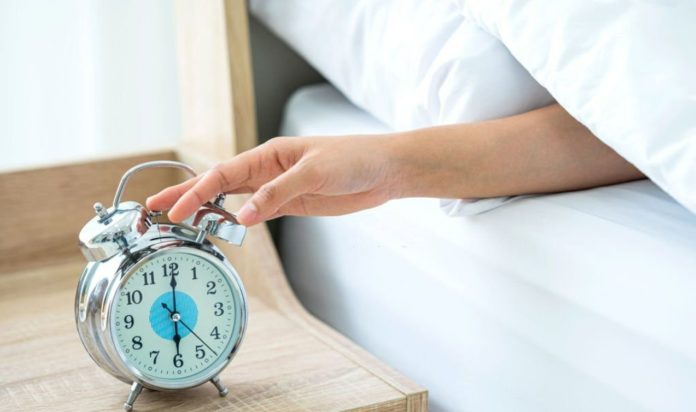Research shows that people who receive more than eight hours of sleep every night are more likely to acquire a degenerative eye condition.
Eye professionals have warned that sleeping too much can cause blindness.
Snoozing too much might harm your eyesight, according to study, since sleeping for more than eight hours a night can lead to macular degeneration, the biggest cause of blindness.
Longer sleepers are also seven times more likely to develop geographic atrophy, which is the advanced stage of the disease.
The disease known as age-related macular degeneration (AMD) gradually kills sharp, center vision. In persons over the age of 60, it is the primary cause of serious vision loss.
While there is no pain, the macula – the region of the eye that allows you to see fine detail – is deteriorating, making driving and reading nearly impossible.
Northern California Retina Vitreous Associates’ specialist Rahul N. Khurana conducted research on people with and without the disease.
Dr. Khurana studied the sleep habits of 1003 patients and published his findings in the journal Retina.
He said: “The mean sleep duration for patients without AMD was 7.97 hours, compared with 8.17 hours, 9.00 hours, and 8.97 hours, respectively, for those with early AMD, neovascular AMD, and geographic atrophy.
“The altered sleep patterns illustrate another morbidity that patients with AMD suffer from, and merit further investigation.”
These findings follow the discovery by scientists that lying face down on your pillow can cause vision loss.
Sleeping with your face pressed on a pillow can lead to glaucoma, a disorder that remains untreated in thousands of individuals every year.
Glaucoma develops when aqueous humour, a fluid in the eye, fails to drain properly, placing pressure on the optic nerve and causing nerve fibers to die off, resulting in vision loss.
Over the course of an eight-hour sleep period, researchers at John Hopkins University in Baltimore, Maryland, investigated the effect of pillow pressure on the eyes of their patients.
It discovered that sleeping with one side of the face and one eye squashed into a pillow can result in ‘deformation’ of the affected eye in glaucoma sufferers.
According to lead researcher Dr. Alison Flatau, deformation of the eye during sleeping may restrict the outflow of aqueous humour, resulting in increased intraocular pressure (IOP).
She said: “If stress and strain from elevated IOP are bad for eyes with glaucoma, stress and strain from being compressed by a pillow might also be bad for eyes with glaucoma.
“On average, glaucoma eye responses did not fully return to baseline levels after moving from face down to supine, but control eyes did.”
Dr. Flatau further stated that those with ‘prominent’ noses or cheekbones, which prevent direct contact with a pillow, maybe less prone to suffer from sleep position-induced eye deformation, whereas those with short cheekbones and a little nose are more likely to suffer.
“Glaucoma is a silent killer when it comes to the eyes,” stated Dr. Allamby, founder and medical director of Focus Clinic.
“Sufferers often don’t know they have it until they’re already losing their vision.
“And what this study shows is that people could be making the condition worse – effectively speeding up the damage – by simply sleeping in the wrong position.
“This slight increase of pressure on the optic nerve could have significant repercussions in those susceptible to nerve damage.”
Whether treated with eye drops, laser treatment, or surgery, early detection of glaucoma is critical in preserving a patient’s vision.
For people in their 40s, Dr. Allamby suggests regular, in-depth eye examinations by an optometrist at least once every two years.
According to another research published in the European Heart Journal, oversleeping affects health the same way as does sleeping too little.
The team looked at the sleeping habits of almost 116,000 adults in the Prospective Urban Rural Epidemiology (PURE) project, who were between the ages of 35 and 70.
During the study’s eight-year follow-up period, 4,381 participants died and 4,365 experienced a heart attack or stroke.
They discovered that persons who slept longer than the recommended 6–8 hours per night were more likely to die young or acquire the cardiovascular disease.
People who slept 8–9 hours had a 5 percent higher risk of dying prematurely or developing cardiovascular problems than those who slept the recommended amount.
Those who slept 9–10 hours had a 17 percent higher chance of dying or developing heart and blood vessel problems. Similarly, persons who slept for more than 10 hours on a regular basis were 41 percent more likely to die young or suffer cardiovascular problems.
In addition, those who slept 6 hours or fewer had a 9 percent increased risk of the above-mentioned consequences. The authors do point out, however, that this rise was not statistically significant.
Image Credit: Getty
You were reading: Sleeping too much could make you go blind – says study
